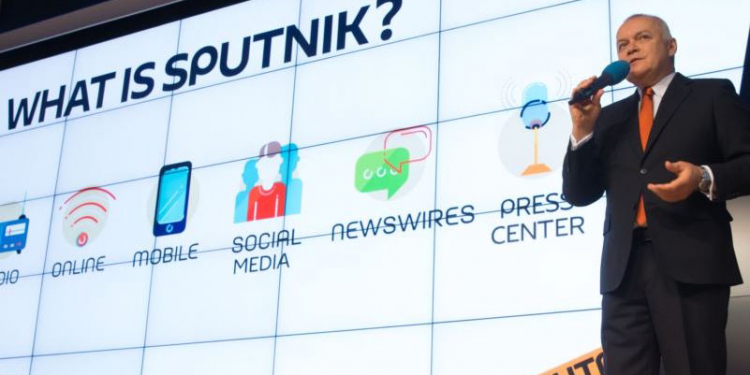The FINANCIAL — US sanctions against Russian state media have forced three television channels off Russian pay-TV platforms. The Denis Diderot Committee urges the EU to take similar sanctions against Russian pay-TV platforms on Eutelsat satellites. Sanctions against platforms should stop the collaboration of Eutelsat with the Kremlin war propaganda machine and liberate frequencies for news and independent Russian speaking channel.
The US satellites companies Horizons and Intelsat have started to implement US sanctions against the channels of the Russian State company, VGTRK. Telekanal Zvezda has been taken off the air on Horizons 2H; Rossiya 1 and Rossiya 24 are off the air on Intelsat 15.1 Both satellites broadcast the Russian pay-TV Telekarta, a platform with 3 million subscribers.
The decision to levy sanctions against VGRTK was announced May 8th by the U.S. Department of the Treasury’s Office of Foreign Assets Control (OFAC).
The Denis Diderot Committee considers this the first case of Western sanctions forcing channels within Russia off the airwaves.
“This action proves that sanctions can actually force changes within Russia’s media landscape, which is dominated by extreme propaganda,” says Andre Lange, coordinator of the Denis Diderot committee. The committee was formed to promote freedom of information within Russia and the free flow of information between Europe and Russia. He continued, “Eutelsat should also take heed of these sanctions. Critically they must allow for alternative TV channels to uplink on their 36E position.”
It is possible that by continuing to work with Russian companies sanctioned by the United States, Eutelsat S.A., a company of which the French State is the major shareholder, is jeopardizing its own significant activities in this country, where its subsidiaries have the U.S. Department of Defense as a client.
The Eutelsat 36E position is extremely popular within Russia, reaching more than 50% of households and is used by the pay-TV platforms Trikolor and NTV+. The total audience of both platforms is estimated to be 15 million of Russian households. The two platforms are still censoring eight international news channels. EU sanctions could liberate frequencies on 36E. Those frequencies could then be leased to international news channels, Russian speaking channels already existing in various European countries and independent Russian channels offering viewpoints closer to the realities of the war in Ukraine.
The NTV Plus company is part of the Gazprom Media Holding, already on the OFAC list. The Trikolor platform is operated by the JSC National Satellite Company, of which the GS Group has a leading share, with the support of the VTB Bank, the second largest Russian public bank. VTB Bank is on the EU, UK and US sanction lists. Trikolor, the leading pay-TV in Russia, recently asked financial support to the Ministry of Communications and to the Duma in order to continue its activities. According to a report by the Russian consultant J’Son & Partners, television and VoD companies are facing significant declines in advertising and subscriptions revenues since the beginning of the war and the progressive withdraw of Western companies.
The last 8th May, the leader of the G7 stated “We will continue our efforts to fight off the Russian regime’s attempts to spread its propaganda. Respectable private companies should not provide revenue to the Russian regime or to its affiliates feeding the Russian war machine.”. In an address to her European colleagues on May 12th, Mrs Olha Herasymiuk, President of the Ukrainian broadcasting authority requested: “all contracts with Russian media companies should be terminated”.
To make those objectives concrete, the Denis Diderot Committee has drafted the text for a possible EU decision, available on its website: https://denisdiderot.net
The Denis Diderot Committee also urges France (which has the regulatory competence on non-EU channels transmitted by the French satellites Eutelsat) to take similar measures with these Russian channels which regularly violate the limitations of freedom of expression as defined in article 10 of the European Convention of Human Rights. If the new French government wishes to promote digital sovereignty, it should not allow French satellites to be used for promoting the Russian aggression against the peace in Europe.
In recent days, viewers of Rossyia 1, the most popular state channel in Russia, have been able to witness, within the framework of the flagship program of journalist Vladimir Soloviev, some thunderous statements. Margarita Simonyan, editor-in-chief of the RT channel, said that in Russia, as in China, information centralized by the state was the only possible solution, and that freedom of expression had been enshrined in the Russian Constitution by the will of the Western powers. Another speaker defended the legitimacy of the use of nuclear weapons in the context of a Third World War, which Russia would have the right to launch to defend itself against the coalition of 40 Nazi states. An academic explained that there is no Ukrainian culture or language. Yet another wondered why the Russian military did not target foreign leaders when visiting Ukraine. Film director Karen Shakhnazarov proposed creation of concentration camps for the opponents to the “operation Z”.
The Denis Diderot Committee was created in March 2022 by European media researchers, experts and professionals to contribute to the restoration of the free flow of information, without war propaganda, between Europe and Russia with a view to providing support to Ukrainian, Russian and Belarusian civil societies.

































Discussion about this post